By Jeff Lund
The guy in the camo hat has impressively moved from hunting turkey on a ranch on which he has private access, to elk hunting, without providing the guy with the other camo hat enough time to participate in the discussion. The guy spoke like Joyce or Faulkner wrote, but without being Joyce of Faulkner.
His volume is up either because he is so excited, or he wants everyone to know that the 6 x 6 elk he got last year was not bad. But there’s an undertone. “Not bad” means “not bad” to someone of his stature. A lesser hunter would be thrilled. I can’t see him, but I can imagine the smirk. I’ve seen the smirk. I’ve done the smirk.
It’s the smirk and tone of a successful hunter in the throes of the dopamine high of storytelling.
He pauses for 17 seconds. The quiet is too much. He’s got to fill the air.
Shrimp. Then how sea otters get into his crab pots, then he jokes about how many he thinks he could get with his boat prop if he dropped the hammer and tore through a channel that is particularly populated with them. Sea otters, not shrimp.
No one else seems to care about the conversation, or if they do, they are keeping to themselves. (Then there’s me, taking notes to write about it later…no one is safe from journalists!)
These conversations used to be limited to people within earshot and whomever they decided to tell later. There are a few younger people next to me that look like they are part of a group from the Lower 48 on their first pilgrimage to the wilds of Alaska, and they also don’t look like they are into how many sea otters the guy in the camo hat can take out with his fishing boat.
Suppose they think camo hat guy is the quintessential hunter. The typical resource exploiter who never tires of blood. They had heard of hunters before, but never met one. Ladies and gentlemen: camo hat guy.
Being reflective is not about high ground. It’s not about your place compared to others and it sure isn’t clout chasing. It’s about taking the time to find depth in the personal definition of hunting and conservation, because like it or not, sound travels further than it used to, which then motivates more spending on lawsuits and writes more emotional, science-free legislation.
Emotional, science-free legislation is not exclusive to Democrats or Republicans, but that’s for another section of the paper.
Anyway, there’s a perception that anyone who criticized hunting is anti-hunting and is often met with a “hunters need to stick together” comment. True, but that doesn’t mean that we shouldn’t reflect. Personal choices aren’t confrontational statements. Most are as simple as a preference that aren’t rooted in assumed high ground or superiority. Though there are people who think they are above others or who comment as if they have never made an error in their lives.
As an angler who prefers catching steelhead with a fly, I know all about the perception of superiority. I just like it, I don’t look down on the crowd with spinning reels, though that is the assumption many make. However, both groups know about the contradiction of loving to catch a fish we don’t intend to eat.
We are afforded the freedom to make our decisions regarding how we hunt and fish and how we then post or talk about it. Tell all the stories you want as loud as you want. I am not an advocate for censorship by a private company, governing body or the practice of self-censoring.
But self-awareness is worth noting.
• Jeff Lund is a freelance writer based in Ketchikan. His book, “A Miserable Paradise: Life in Southeast Alaska,” is available in local bookstores and at Amazon.com. “I Went to the Woods” appears twice per month in the Sports & Outdoors section of the Juneau Empire.

